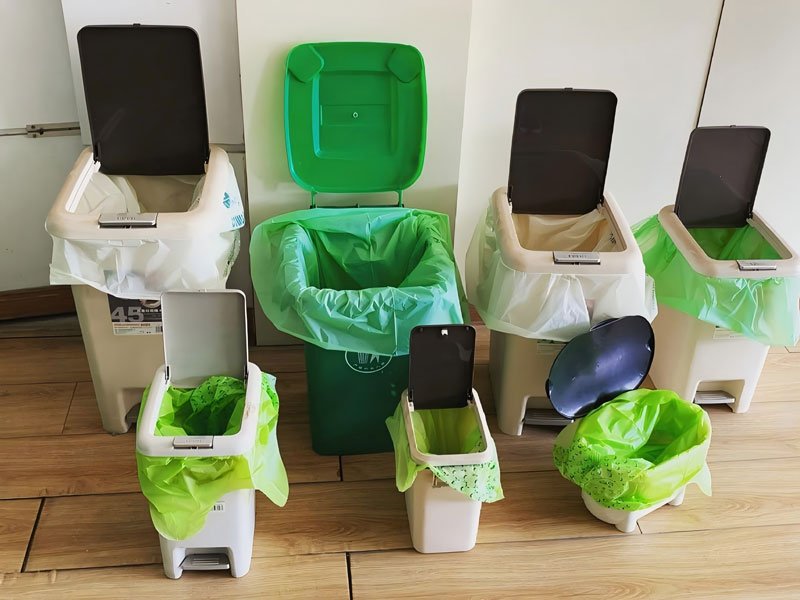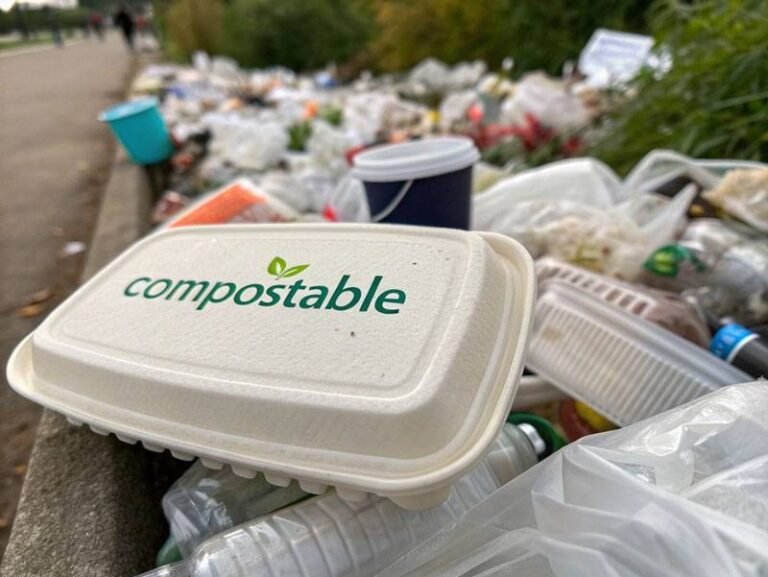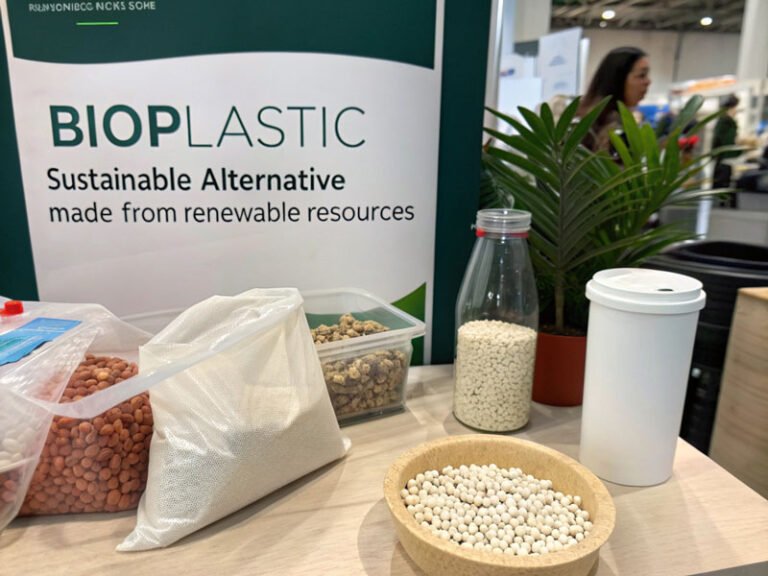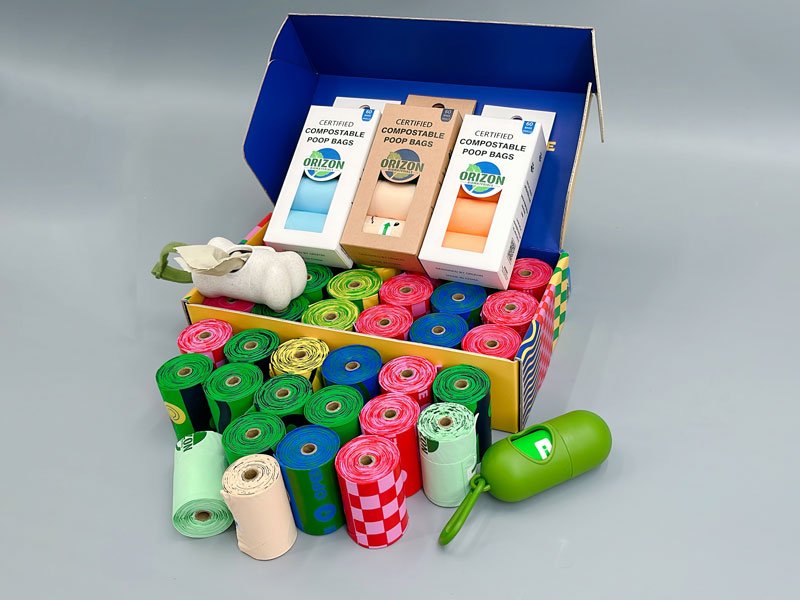In our impression, plastic bags have penetrated into our lives, but environmental pollution is also becoming increasingly serious. Compostable bags have now become a new type of environmentally friendly product, replacing plastic bags. “What is a compostable bag? Is it the same as a degradable bag? How should I choose?”
This article will help you fully understand compostable bags from multiple angles, including definition, materials, uses, differences from degradable bags, certification standards, brand recommendations, and purchasing channels.
What Is a Compostable Bag
Compostable bags (biodegradable garbage bags) is an environmentally friendly bag that is completely decomposed by microorganisms into carbon dioxide, water and organic matter under specific composting conditions (industrial composting facilities), usually within 90-180 days. Unlike traditional plastic bags, compostable bags do not leave toxic residues and fully integrate into the natural environment. They can stay in landfills for centuries, providing an environmentally friendly alternative for managing organic waste.
Compostable Bag Certification Standards:
- BPI certification (US): indicates that the bag completely decomposes under industrial composting conditions.
- TÜV OK Compost Home certification (Europe): suitable for home composting.
- EN 13432 (EU): indicates that it meets the strict EU requirements for compostable products.
What Are Compostable Bags Made Of
Compostable bags are made from plant-based or bio-based materials, such as:
- Corn Starch: A common renewable resource, providing flexibility.
- Polylactic acid (PLA): Derived from fermented plant sugars, it is a new type of bio-based material with high heat resistance, high strength, high toughness, and durability.
- PBAT: A biodegradable polymer with excellent ductility, heat resistance, and biodegradability.
- Cellulose: Plant-derived fiber for lightweight bags.
How Do Compostable Bags Work?
Compostable bags break down with the help of microorganisms, heat, and moisture. In industrial composting facilities that reach temperatures of 50-60°C, they typically break down in 3 to 6 months. Home compostable bags certified by TUV OK Compost Home can also break down in a backyard compost bin – but because backyard composting operates at lower temperatures, the process usually takes longer, about 6 to 12 months.
Keep in mind that not all compostable bags are suitable for home composting. Always check the certification label. For example, many compostable dog poop bags are designed to break down only in an industrial composting environment where the conditions are just right.
Home composting vs industrial composting:
Industrial composting: decomposes quickly and is best suited for compostable bags.
Home composting: temperature and humidity are unstable, so you need to choose products that have been certified by TÜV OK Compost Home.

Compostable vs. Biodegradable vs. Plastic Bags
- Compostable Bags: Meet strict standards like ASTM D6400 or EN 13432, ensuring they decompose completely in composting environments (usually industrial facilities) without leaving toxic residues. They’re ideal for organic waste like food scraps or pet waste.
- Biodegradable Bags: Degrade over time but may not fully break down or require specific conditions. Some leave microplastics, making them less environmentally friendly.
- Plastic Bags: Non-biodegradable, contributing to long-term pollution. They’re cheap but harmful to ecosystems.
- Recyclable Bags: Designed for recycling systems, not composting, and unsuitable for organic waste.
Compostable bags are certified by organizations like the Biodegradable Products Institute (BPI) or TUV OK Compost, ensuring they meet environmental standards. If you’re wondering are compostable bags eco-friendly?, the answer is yes—when used and disposed of correctly.
Advantages and Disadvantages of Compostable Bags
Advantages
- Environmentally friendly and safe: Using compostable bags can greatly reduce plastic pollution and reduce landfill waste, especially for people who want to live a more environmentally friendly life.
- Safe decomposition: These bags will not leave harmful substances after decomposition, and the compost they become can also help crops and gardens grow better. It is really environmentally friendly and practical.
- Regulatory compliance: Regulations such as California’s SB 1383 require the use of compostable bags to handle kitchen waste. Using them can help you easily comply with regulations and avoid trouble.
- Multi-purpose use: Not only can it hold food waste, but it can also be used for pet poop and gardening waste, which is super convenient.
Disadvantages
- Higher Cost: Priced at $0.03-$0.08 per bag, compared to $0.01-$0.03 for plastic bags.
- Specific Conditions: Most require industrial composting facilities; home composting is slower or impractical without proper certification.
- Strength Limitations: Some bags are thinner, less ideal for heavy or wet waste.
For environmentally conscious users, the benefits often outweigh the costs, especially when paired with proper composting infrastructure.
Uses of compostable bags
Pet waste disposal
Compostable dog poop bags are not only convenient for dog walking, but also environmentally friendly, and are loved by green pet owners.
Kitchen waste disposal
The kitchen often produces a lot of wet garbage such as fruit peels, vegetable leaves, coffee grounds, etc. Using compostable bags can avoid plastic bags from polluting organic waste and improve the efficiency of kitchen waste composting.
Gardening and agriculture
Fallen leaves, grass clippings, trimmed plants, etc. generated during gardening activities can be collected in compostable bags for centralized composting.
Commercial applications
Catering takeout, grocery stores, retailers, etc. are increasingly using compostable packaging bags to enhance their brand image and respond to environmental regulations.

Top Brand Recommendations
| Brand | Price (per 100 bags) | Use Case | Certifications | Features | Purchase Link |
|---|---|---|---|---|---|
| Earth Rated | $6–$8 | Dog Poop Bags | BPI | Lavender-scented, leak-proof, eco-friendly | Amazon/Chewy |
| BioBag | $5–$10 | Kitchen/Garbage Bags | BPI, TUV | Odor-resistant, durable, multi-size | Amazon |
| UNNI | $4–$7 | Multi-Purpose | BPI, TUV Home | Home-compostable, affordable | Amazon |
| HoldOn | $8–$12 | Heavy-Duty Garbage | BPI, TUV Home | High strength, ideal for wet waste | Walmart |
- Earth Rated: Compostable dog poop bags are your ideal choice. The product is BPI certified, not only has a strong fragrance, but also lasts for a long time. The price of 100 pieces is about $6 to $8, which is a bit expensive, but the quality is high and is loved by pet owners.
- BioBag: More suitable for handling food waste, it has obtained both BPI and TUV certifications, and there are many sizes to choose from. The price of 100 pieces is between $5 and $10, which is very suitable for home and commercial use and flexible.
- UNNI: Affordable and civilian, it has obtained TUV OK home composting certification and is affordable. The price of 100 pieces is about $4 to $7, which is suitable for home composting and has a variety of uses. Very popular.
- HoldOn: Wet food waste or garden waste, especially suitable for handling heavy or wet waste. These bags are strong and durable, and they are also TUV certified. The price is slightly higher, about $8 to $12 for 100 pieces, but the quality is absolutely reliable.
These brands balance quality, affordability, and environmental impact, making them top picks for 2025.
Where can I buy compostable bags?
Online platform:
- Amazon offers Earth Rated, BioBag, and UNNI, and you can enjoy discounts of 5% to 15% on subscription savings plans. In many states, free shipping over $25 is a good deal.
- Chewy specializes in compostable dog poop bags, and there are frequent pet product promotions that pet owners can pay more attention to.
- Walmart has affordable models like HoldOn, and you can also choose to pick them up in-store, which saves a lot of shipping costs.
Offline store:
- Whole Foods can usually buy BioBag and other eco-friendly brands, which are especially suitable for friends in the city.
- Target also stocks compostable kitchen bags, which are often competitively priced.
- Local environmentally friendly small shops support small businesses. Although the price may be slightly higher, it makes more sense to buy.
Regional factors:
If you’re in a place like California or New York, taxes and shipping can drive up prices. Don’t forget to check local composting regulations, such as California’s SB 1383, to make sure you’re buying bags that meet the requirements.
Money-saving tips:
- Try to buy large packages, such as 500 to 1000, so that the cost of a single bag is lower.
- Take advantage of Amazon or Chewy coupons and Black Friday sales.
- Subscribing to a service for automated delivery can also save you a lot.
Overall, for the cheapest compostable bags, Amazon and Walmart are good choices; if you’re specifically looking for pet bags, Chewy is a better fit.
How to choose a Compostable Bag
- Capacity and thickness: For household kitchen waste, it is recommended to choose a 3-gallon capacity, with a thickness of ≥0.025mm to prevent rupture5;
- Certified brands: Recommended brands such as BioBag and EcoSafe that have passed EN 13432 certification68.
Precautions for use
- Storage conditions: Avoid high temperature and humidity environments. The shelf life of unopened bags is 2-3 years8;
- Disposal method: Confirm whether the local composting facility accepts industrial compost bags. Household compost needs to be cut into pieces to accelerate decomposition.
Conclusion
Compostable bags are an important step toward a sustainable future, providing an eco-friendly solution for pet waste, food waste, and more. By understanding what compostable bags are—what they’re made of, their certifications, and their uses—you can make smart choices that align with an eco-friendly lifestyle.
Ready to go green? Contact us to order more custom compostable bags, and share this post to spread the word about sustainable waste solutions!
FAQ
Can compostable bags break down in a home compost bin?
Only certain compostable bags are designed for home composting—specifically the ones certified with TUV OK Compost Home, like UNNI or HoldOn. These are made to decompose in backyard compost conditions. Most other compostable bags need the higher heat and controlled environment of an industrial composting facility to break down properly.
What’s the difference between compostable and biodegradable bags?
While both sound eco-friendly, there’s a big difference.
- Compostable bags are designed to break down completely into non-toxic components like water, CO₂, and organic matter—as long as they meet standards like ASTM D6400.
- Biodegradable bags, on the other hand, can break down too, but often only partially and sometimes leave behind microplastics. So, compostable is usually the safer bet for the environment.
Are compostable bags actually eco-friendly?
Yes—when they’re disposed of the right way. If sent to a composting facility (or home compost bin, if certified), compostable bags can help reduce plastic pollution and turn food waste into nutrient-rich compost. Just remember: tossing them into the regular trash or a landfill won’t have the same eco-friendly effect.
Are compostable bags good for dog poop?
Absolutely! Compostable dog poop bags like Earth Rated are durable and eco-friendly, ideal for pet waste cleanup.
How much do compostable bags cost?
Prices range from $0.03-$0.08 per bag, depending on brand and use case, compared to $0.01-$0.03 for plastic bags.




